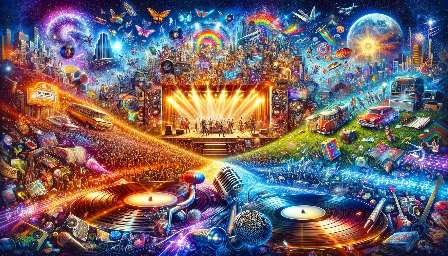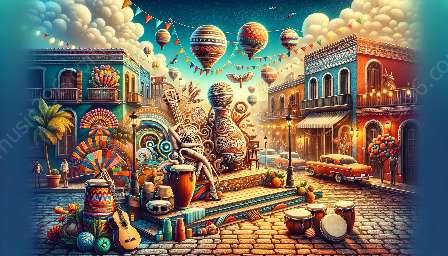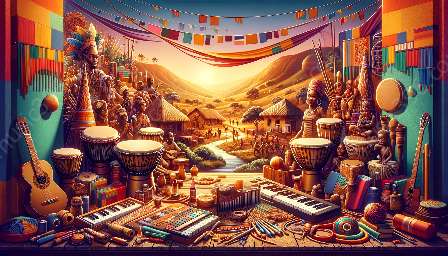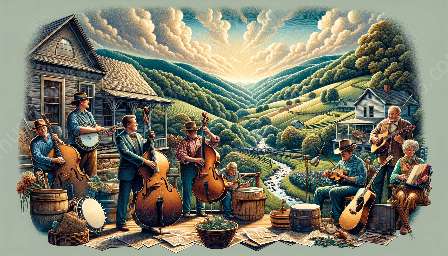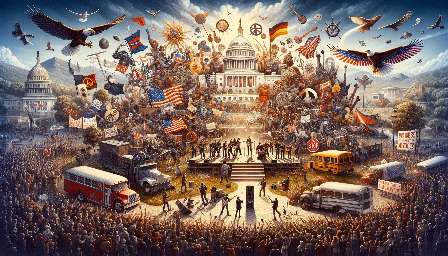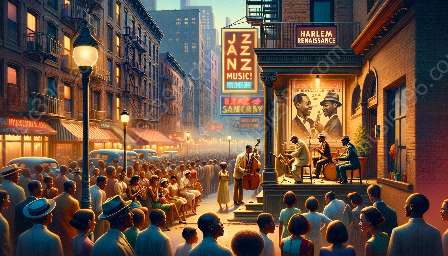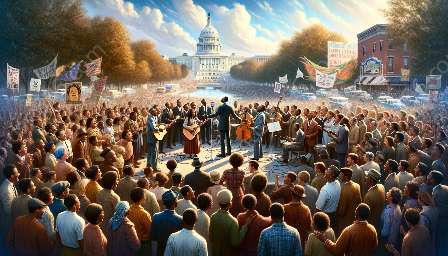As an art form deeply rooted in social, cultural, and political contexts, hip hop music has transcended geographical boundaries to become a global phenomenon. Within the hip hop culture, music festivals and events play a crucial role in shaping the movement's impact on the global community. This comprehensive exploration delves into the history of hip hop music, the broader history of music, and the significant contribution of hip hop music festivals and events to the global community, offering a compelling and insightful analysis.
History of Hip Hop Music
Hip hop music emerged in the South Bronx in the 1970s, characterized by its rhythmic rhyming and lyrical storytelling. It served as a form of expression for marginalized communities, addressing societal issues and celebrating cultural heritage through music and dance. The genre's roots can be traced back to African drumming traditions, spoken-word poetry, and jazz improvisation, ultimately evolving into a distinct musical style with its own vocal and rhythmic elements.
As hip hop music gained traction, it became a platform for expressing political dissent, advocating for social change, and amplifying the voices of underrepresented groups. The genre's rise was closely intertwined with the development of DJing, b-boying (breakdancing), and graffiti art, collectively forming the four fundamental elements of hip hop culture.
Evolution of Hip Hop Music
Over the decades, hip hop music has undergone significant evolution, diversifying into subgenres such as gangsta rap, conscious hip hop, mumble rap, and trap music, each reflecting distinct lyrical content and musical styles. This evolution has contributed to the genre's global appeal, resulting in the emergence of hip hop scenes in different countries and cultural contexts.
With its roots firmly planted in the African American and Latino communities, hip hop music has served as a vehicle for self-expression, empowerment, and community building. It has also been a powerful tool for addressing social justice issues, shedding light on systemic inequalities, and advocating for change.
History of Music
The history of music is a rich tapestry woven across different cultures, eras, and traditions. From ancient civilizations to the present day, music has been an integral part of human expression, encompassing a diverse array of genres, styles, and forms. Throughout history, music has reflected the social, cultural, and political landscapes of its time, serving as a mirror to society and a catalyst for change.
Various musical movements and genres have emerged, each leaving an indelible mark on global music culture. From classical compositions to folk traditions, from jazz and blues to rock and roll, music has continually evolved, adapting to the changing dynamics of society while retaining its core ability to evoke emotion, convey narratives, and foster connections among individuals.
Impact of Music on Global Communities
Music has the remarkable ability to transcend linguistic and cultural barriers, resonating with audiences across the globe. It serves as a unifying force, facilitating cross-cultural exchanges and fostering mutual understanding among diverse communities. Music festivals and events have played a pivotal role in this regard, serving as platforms for artists to showcase their talents, engage with audiences, and bridge cultural divides.
Moreover, music has often been at the forefront of social movements, amplifying voices of dissent, advocating for human rights, and promoting messages of solidarity and empowerment. This impact extends beyond national borders, creating networks of solidarity and shared experiences that contribute to the global community's fabric.
Contribution of Hip Hop Music Festivals and Events
Hip hop music festivals and events hold a unique position in the global music landscape, leveraging the genre's cultural and social significance to foster connections and empower communities. These gatherings provide a platform for artists, DJs, dancers, and graffiti artists to showcase their talents, while offering audiences an immersive experience that celebrates hip hop culture's diverse elements.
Celebrating Cultural Diversity
By featuring a lineup of both established and emerging hip hop artists from diverse backgrounds, festivals and events contribute to the promotion of cultural diversity within the global hip hop community. They offer a space for artists to share their unique perspectives, narratives, and artistic expressions, enriching the collective tapestry of hip hop music and its global reach.
Moreover, hip hop festivals and events often incorporate elements of urban arts and culture, showcasing graffiti art exhibitions, breakdancing battles, and interactive workshops that provide insights into the roots of hip hop culture and its evolution. These immersive experiences encourage cross-cultural exchanges and dialogue, fostering a deeper appreciation for the interconnectedness of global hip hop communities.
Bridging Communities
Music festivals have the power to connect people from diverse backgrounds, creating a shared space for artistic appreciation and cultural celebration. Hip hop events serve as inclusive forums where individuals from different walks of life can come together to celebrate a common passion for music, dance, and urban art forms.
Furthermore, hip hop festivals often extend beyond the realm of music, incorporating educational initiatives, activism workshops, and community outreach programs that emphasize social empowerment and positive change. This holistic approach strengthens the bonds between hip hop communities worldwide, fostering a sense of solidarity and mutual support.
Driving Social Change
One of the most significant contributions of hip hop music festivals and events to the global community is their role in driving social change. Through their emphasis on individual and collective empowerment, these gatherings amplify diverse voices, advocate for marginalized communities, and address critical social issues such as systemic inequality, racial justice, and human rights.
By providing a platform for artists to express their lived experiences and share stories of resilience, hip hop festivals become catalysts for meaningful dialogue and action. They inspire audiences to reflect on social realities, confront injustices, and work towards creating a more equitable and inclusive society.
Conclusion
In conclusion, hip hop music festivals and events hold immense cultural, social, and political significance in shaping the global music landscape. Rooted in the rich history of hip hop music and the broader history of music, these gatherings serve as dynamic platforms for celebrating cultural diversity, bridging communities, and driving social change. By fostering connections, amplifying diverse voices, and empowering communities, hip hop festivals and events contribute meaningfully to the global community, reinforcing the transformative power of music in uniting people across continents and inspiring positive change.








